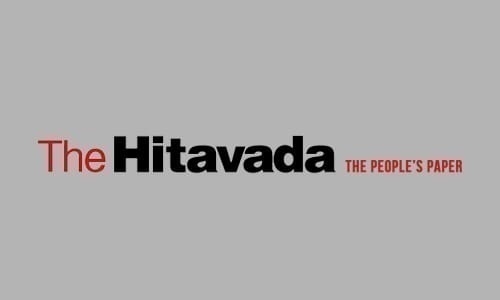Putin’s visit to UAE at odds with US
| Date :11-Dec-2023 |

By James M Dorsey
THE United Arab Emirates walks a geopolitical tightrope, juggling big power rivalries and mounting regional instability fuelled by the Gaza war. Putin’s movements beyond the confines of Russia are restricted. Signatories of the Rome Statute that established the International Criminal Court are obliged to arrest Putin against whom the court has issued a Ukraine-related international arrest warrant. Visiting the UAE and Saudi Arabia was a safe bet. Neither country is a signatory to the Rome Statute. Even so, Putin’s visit puts the UAE at odds with its foremost security partner, the United States, that wants its allies to implement Western sanctions against Russia for its 2022 invasion of Ukraine. The UAE, like other Gulf countries, has done everything but.
Trade between Russia and the UAE increased by nearly 68% on the year to US $9 billion in 2022, according to Russian state news agency Tass. Russian exports to the UAE comprised US $8.5 billion of that total. Some one million Russians visited the UAE last year.
Similarly, the United States has pressured the UAE to halt alleged arms supplies to the rebel Rapid Support Forces (RSF) in Sudan that has been fighting the country’s armed forces since April. The UAE denied supporting the RSF. The UAE, despite US designation of Emirati companies for violating sanctions against Russia, has so far successfully leveraged its value to the United States and Europe to ensure that it doesn’t rupture relations.
The UAE has earned brownie points in Washington with its recognition of Israel in 2020 along with Bahrain and Morocco, rejection of calls to break off diplomatic relations with the Jewish state in protest against the Gaza war, condemnation of the October 7 Hamas attack, and its support of the United States in Afghanistan.
The UAE is quietly positioning its Palestinian protégé, Mohammed Dahlan, a controversial Gaza-born former Al-Fatah security chief in the Strip opposed to Palestine Authority President Mahmoud Abbas, as a potential compromise Gaza administrator once the guns fall silent. Of all the options for governing Gaza in the immediate aftermath of the war being discussed in world capitals few seem politically viable, making Israeli reoccupation a realistic possibility. With the US and much of the international community ruling out Israeli reoccupation, Dahlan could emerge as an alternative. Dahlan’s close associate, Samir al-Mashharawi, together with former Palestine Authority Foreign Minister Nasser Al-Qudwa, a proponent of political reform, met in Qatar this week with Hamas exile leaders Khaled Mishaal and Ismail Haniyeh.
This week, signalling its intention to keep relations on an even keel, the Biden administration approved the $85 million sale of 18 AN/TPQ-50 radar systems to the UAE.
The system is a counter-battery radar designed to identify and track incoming indirect fire, including rockets, artillery, and mortars.
“The UAE is a vital US partner for political stability and economic progress in the Middle East,” the Pentagon said in a statement, adding the “sale will support the foreign policy and national security of the US by helping to improve the security of an important regional partner.” Beyond oil, trade, and Ukraine, Gaza figured high on Mr. Putin’s agenda. Arab media reports suggested that the UAE sought Russian assistance in moving Iranian militias in Syria away from the Israeli-occupied Golan Heights in an effort to prevent a regional expansion of the Gulf war.
In October, the UAE warned Syrian President Bashar al-Assad not to intervene in the war or allow attacks on Israel from Syrian soil. Preventing an expansion of the war is a key US and Emirati interest. The UAE played a key role in returning Syria to the Arab and Muslim fold after a decade-long suspension of Syrian membership of the Arab League because of its conduct of the civil war that was little different from the way Israel wages war in Gaza. Mr Assad’s participation in last month’s Arab and Muslim summit calling for a ceasefire displayed the same hypocrisy Western countries exercise in their different approaches to the wars in Ukraine and Gaza.
Although not publicly mentioned, UAE concerns about increased Russian-Iranian military cooperation and UAE restrictions on the re-export to Russia of sensitive goods used for military purposes in Ukraine were certain to have come up in Mr Putin’s discussions.
Putin will have been relieved that the UAE had yet to implement the restrictions even though it promised to do so in September when US, British, and European officials visited Abu Dhabi to voice concern about the Gulf country’s links to Russia. The UAE said after the visit that it was considering introducing export licences on certain technologies, including semiconductors. The UAE insists that it restricts, as a matter of policy, the export and re-export of identified dual-use products to conflict zones and has a legal export control framework in place.
Xiao, who renounced his US citizenship to become an Emirati national, said the company was phasing out Chinese hardware to ensure access to US-made chips. US national security advisor Jake Sullivan cautioned Bin Zayed earlier this year about US concerns about G42’s close cooperation with Chinese companies, including Huawei, the telecommunications giant under US sanctions.
US officials warned their UAE counterparts that G42 could be sanctioned. Huawei provided G42 with servers and data centre networking gear. Even so, a US Congressional Research Service report cautioned earlier this year that “the degree to which the UAE may leverage its ‘soft power’ in ways that are beneficial to US interests remains to be seen.” (IPA) (By arrangement with the Arabian Post)